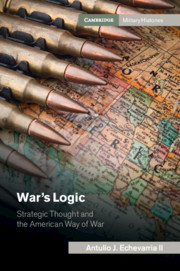2 results
2 - Billy Mitchell and Air Power
- from Part I - First Principles and Modern War
-
- Book:
- War's Logic
- Published online:
- 05 February 2021
- Print publication:
- 18 February 2021, pp 32-56
-
- Chapter
- Export citation

War's Logic
- Strategic Thought and the American Way of War
-
- Published online:
- 05 February 2021
- Print publication:
- 18 February 2021

